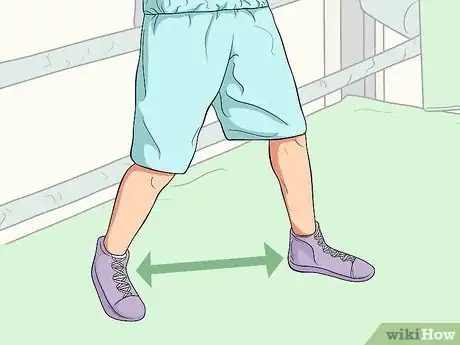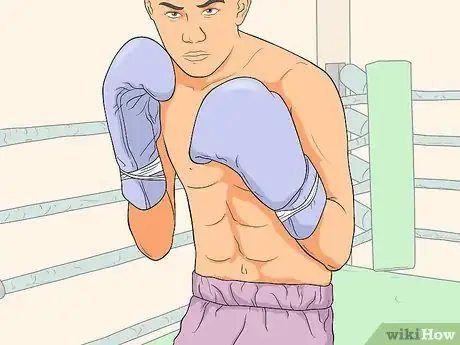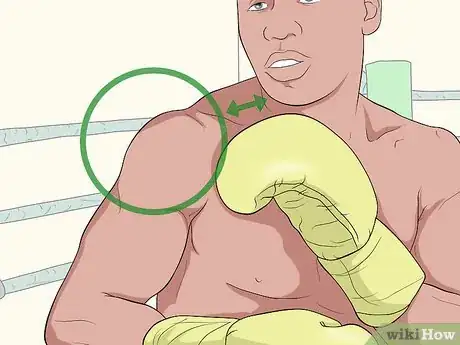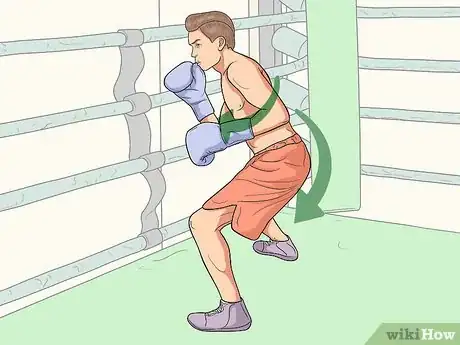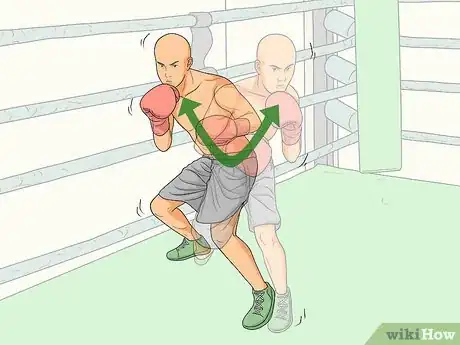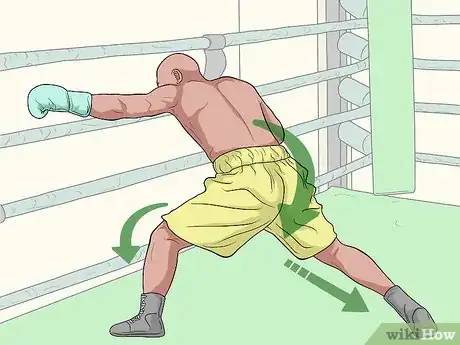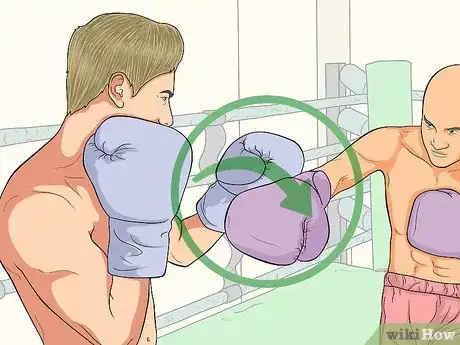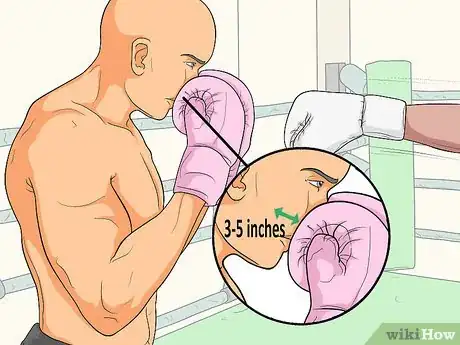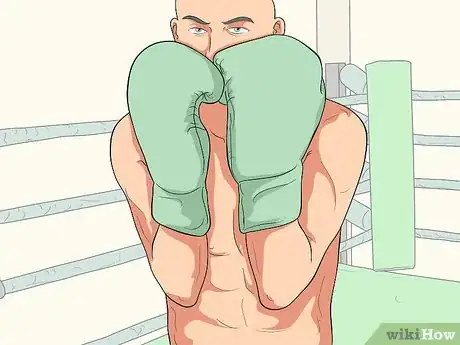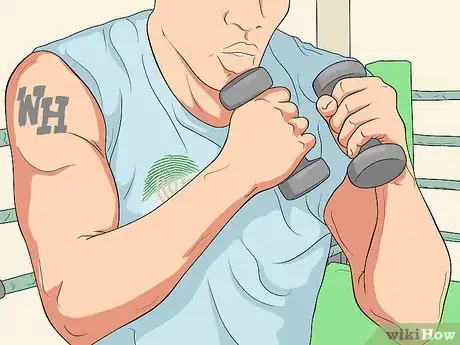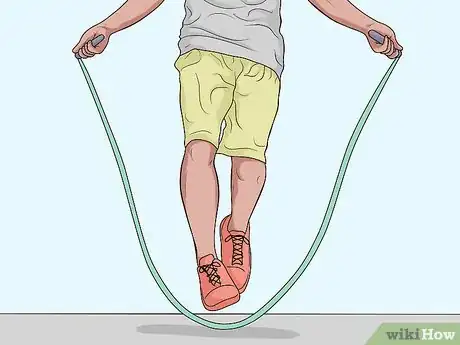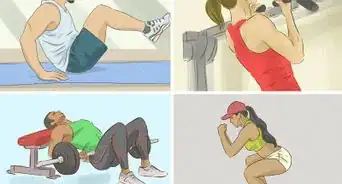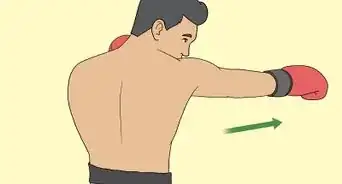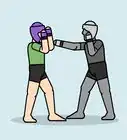This article was co-authored by David Engel. David Engel is a Muay Thai Instructor and Self Defense Trainer based in the San Francisco Bay Area. With over 15 years of martial arts instruction and training experience, David runs California Martial Athletics with co-owner Joe Chernay. He has created and maintained martial arts programs at Rise Combat Sports in San Francisco and Round 5 Martial Arts Academy in San Leandro, with a mission to provide students with a level of comfort and competency that manifests both within and outside the martial arts context. He is also a registered cornerman for amateur and pro competitors under the IKF (International Kickboxing Federation). David was the youngest apprentice instructor of the Thai Boxing Association of America under Ajarn Chai Sirisute (2009), and was a top-ranked amateur competitor in his weight class (127-130 lb) in California between 2013 and 2015.
wikiHow marks an article as reader-approved once it receives enough positive feedback. In this case, 91% of readers who voted found the article helpful, earning it our reader-approved status.
This article has been viewed 114,908 times.
Often overlooked by amateur boxers, defense is a key to staying in the ring and winning matches. Developing defense involves learning foot, hand, and chin position. You can learn dodges like the slip and bob and weave. Defense also requires you to use blocks like the parry and the double arm block. You can jump rope to increase speed, hold dumbbells to increase your arm stamina, and spar with different partners to learn various fighting styles.
Steps
Positioning Your Body
-
1Set your feet shoulder width apart with heel and toe aligned. You will utilize this stance for both offense and defense, which is why it is so important. This width gives you the best ability to move and the alignment will help you move easily. The foot of your non-dominant hand side should be forward.[1]
- Traditional right-handed fighters should have their left foot forward. Southpaw left-handed fighters should have their right foot forward.
- If your feet get too close together it will cause you to get off balance. If your feet get too wide then you will take heavy steps and will not be able to move quickly.
-
2Put your hands up and keep your elbows tight. This is the most common and effective defensive technique. Your gloves should be at about eye level with your palms toward your face. Tuck your elbows close to your body, tight into your ribs.[2]
- Another arm placement option is to put your non-dominant hand up around the side of your face and your dominant arm across your body between your belly button and your chest.
Advertisement -
3Tuck your chin to your front shoulder. It’s always important to protect your chin from getting hit because it is one of the most vulnerable spots for a knockout hit. With your front shoulder forward of your body, tuck your chin against it.
- You may not stay like this the whole time, but it’s an important movement to get comfortable with. You should be able to quickly tuck your chin at all times.
Dodging Punches
-
1Slip a punch. Slipping involves performing two actions simultaneously. Bend at your waist to lower your upper body. At the same time, twist your torso, bringing your back shoulder toward your front knee. Maintain your glove position during a slip so that you are ready to throw a counter-punch.
- Doing abdominal exercises will help build your strength to perform a slip seamlessly.
- Boxers often try to trade punches. However, getting hit will start to take a toll on you throughout the match, so it's best to train yourself to deliver your attack, then get back out of range where they can't hit you.[3]
-
2Bob and weave. Start the bob by bending your knees and lowering your entire body. Keep your head and chest up. Move your head in a “V” shape so your head ends up on the outside of the punch. Once your head is outside the punch, straighten your legs again.
- This technique does not require that you move your feet.
- You should move quickly during a bob and weave. Practice it often to get the motion and speed timed perfectly.
- Practice by having an opponent throw hooks at your head. Try bobbing and weaving from one direction to another in alternation, then vary the sequence so that you have to respond to your opponent's punch.
-
3Perform a backward lunge. Slide your back foot backward and bend your front knee slightly. This will effectively lower your whole body as well as create distance between you and your opponent. Keep your eyes on their chest and hands as you lunge.
- This is not the fastest or most effective dodge, but it is important to incorporate multiple techniques so that your opponent can’t guess your next move
Blocking Punches
-
1Use a parry to slap a punch away. As the punch comes in, lean your torso back and slap the punch away. Let your opponent’s momentum carry the punch past you. This works best when you slap the punch downward or across your body.[4]
- If your opponent is throwing a left-handed punch, slap it away with your right hand. If your opponent throws a right-handed punch, slap it away with your left hand.
- This is most effective when you immediately throw a punch of your own while your opponent is off balance.
-
2Catch an incoming punch. With your hand in the basic defensive position, your palms should be facing you. As you see the punch coming in, twist your wrist so that your palm faces away from you. Push your hand forward three to five inches to make contact with the punch. Step and lean back slightly to take the impact of the punch.
- Immediately bring your hand back into your defensive position, or use the hand you didn’t block with to throw a quick punch.
-
3Perform a double arm block. Boxers love this technique for its simplicity. As you see the punch coming in, press sides of your forearms tight together. Raise your arms slightly so that your gloves are just below your eyebrows. Take the impact of the punch and get your arms back into standard position.
Using Other Training Techniques
-
1Hold dumbbells while you practice. One of the things that kills your defense is getting tired and dropping your hands down, which leaves you unprotected. The best way to train so that you don’t get tired as fast is to perform all of these defensive techniques while you hold light dumbbells. Your arms will build strength in the muscles that keep your hands up.[5]
- You can also throw punches while you hold the dumbbells to build up strength behind your punches.
-
2Jump rope every day. Jumping rope is great for overall cardio conditioning and for increasing the dexterity of your feet. It helps you build good footwork and improve your speed in the ring. Switch up the jump rope exercises you do by jumping on both feet, then a few jumps on your left foot, and a few on your right foot.[6]
- Push yourself to get more jumps without stopping.
- You can also incorporate more complex moves like butt kickers, high knees, or skips into your jump rope routine.
-
3Spar with an opponent and focus on defense rather than attack. Sparring is important to implementing all of the defensive techniques you’ve learned. Don’t try to beat your opponent during sparring, but try to be effective with your defense.
- It’s also important to spar with as many different people as you can to get used to defending against various fighting styles.
- If you don't have anyone to practice with, try using a slip ball to help you practice your defense. This is a lightweight ball that you hang from a door frame, and you can use it to work on your reactions and head movement without getting hit hard.[7]
Expert Q&A
-
QuestionWhat mistakes should I watch for when I'm defending?
 David EngelDavid Engel is a Muay Thai Instructor and Self Defense Trainer based in the San Francisco Bay Area. With over 15 years of martial arts instruction and training experience, David runs California Martial Athletics with co-owner Joe Chernay. He has created and maintained martial arts programs at Rise Combat Sports in San Francisco and Round 5 Martial Arts Academy in San Leandro, with a mission to provide students with a level of comfort and competency that manifests both within and outside the martial arts context. He is also a registered cornerman for amateur and pro competitors under the IKF (International Kickboxing Federation). David was the youngest apprentice instructor of the Thai Boxing Association of America under Ajarn Chai Sirisute (2009), and was a top-ranked amateur competitor in his weight class (127-130 lb) in California between 2013 and 2015.
David EngelDavid Engel is a Muay Thai Instructor and Self Defense Trainer based in the San Francisco Bay Area. With over 15 years of martial arts instruction and training experience, David runs California Martial Athletics with co-owner Joe Chernay. He has created and maintained martial arts programs at Rise Combat Sports in San Francisco and Round 5 Martial Arts Academy in San Leandro, with a mission to provide students with a level of comfort and competency that manifests both within and outside the martial arts context. He is also a registered cornerman for amateur and pro competitors under the IKF (International Kickboxing Federation). David was the youngest apprentice instructor of the Thai Boxing Association of America under Ajarn Chai Sirisute (2009), and was a top-ranked amateur competitor in his weight class (127-130 lb) in California between 2013 and 2015.
Muay Thai Instructor & Self Defense Trainer One of the most common mistakes I see in boxing is trying to trade with the opponent too much, or trying to absorb a strike to give one back. That can work for a short period of time, but as the fight goes on, it starts to wear on your body. Instead, keep defense in mind, and focus on bobbing and weaving, slipping, or shin blocking in Muay Thai.
One of the most common mistakes I see in boxing is trying to trade with the opponent too much, or trying to absorb a strike to give one back. That can work for a short period of time, but as the fight goes on, it starts to wear on your body. Instead, keep defense in mind, and focus on bobbing and weaving, slipping, or shin blocking in Muay Thai. -
QuestionWhat's the best way to counter after I slip or roll?
 Bananapeel32Community AnswerUse the reverse momentum of your roll. I suggest a body shot or a hook to the head. If you are slipping, you can still use hooks but also a straight shot to the head will work.
Bananapeel32Community AnswerUse the reverse momentum of your roll. I suggest a body shot or a hook to the head. If you are slipping, you can still use hooks but also a straight shot to the head will work. -
QuestionWhat's a good way to see punches coming?
 TheThinkingPanda ZhaoCommunity AnswerStay a bit farther from your enemy. Once the fist is about 1/4 the way there, move back or to the side.
TheThinkingPanda ZhaoCommunity AnswerStay a bit farther from your enemy. Once the fist is about 1/4 the way there, move back or to the side.
References
- ↑ http://www.expertboxing.com/boxing-basics/how-to-box/the-perfect-boxing-stance
- ↑ https://www.talkboxing.co.uk/guides/boxing_guards.html/
- ↑ David Engel. Muay Thai Instructor & Self Defense Trainer. Expert Interview. 5 May 2020.
- ↑ http://www.expertboxing.com/boxing-techniques/defense-techniques/how-to-parry-punches
- ↑ https://breakingmuscle.com/learn/5-ways-to-improve-your-defense-and-win-more-fights
- ↑ http://www.expertboxing.com/boxing-training/boxing-workouts/boxing-jump-rope-training-guide
- ↑ David Engel. Muay Thai Instructor & Self Defense Trainer. Expert Interview. 5 May 2020.
- ↑ David Engel. Muay Thai Instructor & Self Defense Trainer. Expert Interview. 5 May 2020.
About This Article
To develop defense in boxing, take a defensive stance with your feet shoulder-width apart and one foot slightly forward. Put both hands up with your gloves at eye level and tuck your elbows close to your body to protect your face and chest. Once you have a good stance, try practicing the bob and weave technique by bending your knees and moving your head in a “V” shape so you can dart away from where the punch is landing. Alternatively, if you want to block a punch, lean your torso back as the glove comes in and slap it away, either downward or across your body. To learn how to train to support your defense game, read on!
